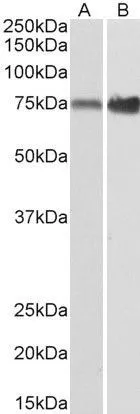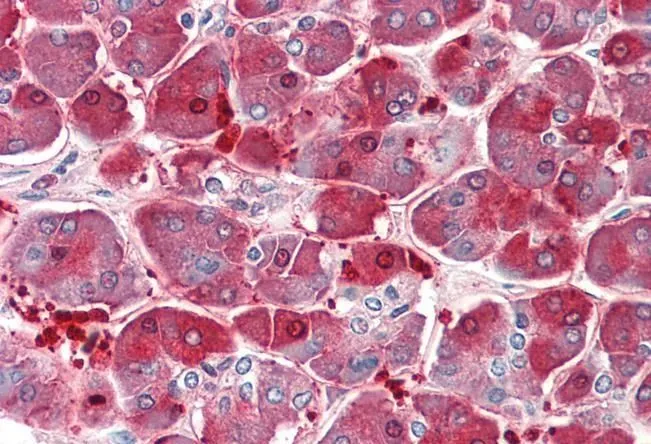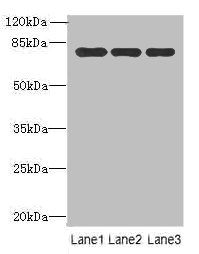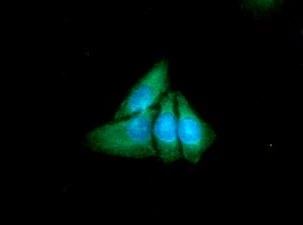
WB analysis of pig pancreas lysate using GTX88401 XPNPEP1 antibody, C-term. Dilution : 0.1μg/ml Loading : 35μg protein in RIPA buffer
XPNPEP1 antibody, C-term
GTX88401
ApplicationsWestern Blot, ImmunoHistoChemistry, ImmunoHistoChemistry Paraffin
Product group Antibodies
ReactivityHuman, Mouse, Porcine, Rat
TargetXPNPEP1
Overview
- SupplierGeneTex
- Product NameXPNPEP1 antibody, C-term
- Delivery Days Customer9
- Application Supplier NoteWB: 0.1-0.3microg/ml. IHC-P: 5microg/ml. *Optimal dilutions/concentrations should be determined by the researcher.Not tested in other applications.
- ApplicationsWestern Blot, ImmunoHistoChemistry, ImmunoHistoChemistry Paraffin
- CertificationResearch Use Only
- ClonalityPolyclonal
- Concentration0.50 mg/ml
- ConjugateUnconjugated
- Gene ID7511
- Target nameXPNPEP1
- Target descriptionX-prolyl aminopeptidase 1
- Target synonymsAPP1, SAMP, XPNPEP, XPNPEPL, XPNPEPL1, xaa-Pro aminopeptidase 1, X-Pro aminopeptidase 1, X-prolyl aminopeptidase (aminopeptidase P) 1, soluble, X-prolyl aminopeptidase 1, soluble, aminoacylproline aminopeptidase, aminopeptidase P, cytosolic, cytosolic aminopeptidase P, soluble aminopeptidase P
- HostGoat
- IsotypeIgG
- Protein IDQ9NQW7
- Protein NameXaa-Pro aminopeptidase 1
- Scientific DescriptionThis gene encodes the cytosolic form of a metalloaminopeptidase that catalyzes the cleavage of the N-terminal amino acid adjacent to a proline residue. The gene product may play a role in degradation and maturation of tachykinins, neuropeptides, and peptide hormones. Alternative splicing results in multiple transcript variants.[provided by RefSeq, Nov 2009]
- ReactivityHuman, Mouse, Porcine, Rat
- Storage Instruction-20°C or -80°C,2°C to 8°C
- UNSPSC12352203











![WB analysis of HEK293T cells transfected with XPNPEP1 plasmid (Right) or empty vector (Left) for 48 hrs using GTX83413 XPNPEP1 antibody [1E7]. Loading : 5 ug per lane](https://www.genetex.com/upload/website/prouct_img/normal/GTX83413/GTX83413_3613_WB_w_23061419_214.webp)